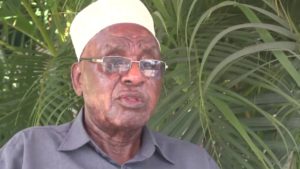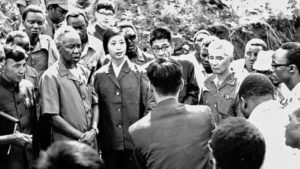by Ben Taylor
Former Minister of Home Affairs and leading opposition Presidential candidate, Augustine Mrema, died in August at the age of 77.
Mrema played a prominent role in national politics for several decades. As Minister of the Interior (Home Affairs) under President Ali Hassan Mwinyi from 1990 to 1994, he campaigned against corruption, waste and tax evasion in a manner that shared much in common with the later efforts of President Magufuli. This eventually led Mrema into disagreement with the President, and he left the ruling party, CCM, six months before the general election in 1995 in order to join the new opposition party, NCCR Mageuzi, and run as the party’s presidential candidate. He ended up losing the election to Benjamin Mkapa of CCM, but winning a greater percentage of the vote (27.8%) than any other opposition candidate until Edward Lowassa in 2015.
During the campaign, Mrema spoke on corruption within CCM, building on his previous attacks while serving as a cabinet minister. He used anti-foreigner rhetoric and castigated the government for siding with foreign investors over citizens, and branded himself as a candidate of the “Walalahoi” (poor and downtrodden), rhetoric that was again echoed later by President John Magufuli.
Through this, Mrema managed to pull massive crowds while campaigning in 1995, appealing to urban youth and those in the informal sector. It is said that his popularity scared Mwalimu Julius Nyerere who had publicly backed Mkapa. Nyerere warned that Mrema was not fit to be President, and that the country would be “thrown into the dogs” with Mrema in the role.
Prior to entering formal politics, Mrema had taught civics and served as a (Bulgarian-trained) intelligence officer. His political career started in 1985 when he tried to run for MP in his home district of Kilimanjaro. His candidacy was blocked by the High Court, and in 1987 he was officially announced as the winner after a lengthy appeals process. He retained his seat in 1990 without much difficulty.
He ran again for President in 2000 (representing NCCR) and 2005 (representing TLP), but found that voters had either decided to stick with CCM or switch their allegiances to other opposition parties, primarily CUF and Chadema. He received just 8% of the vote in 2000 and 1% in 2005. In 2010, he contested the seat of Vunjo, representing TLP, and won, serving as the MP for a single five-year term.
President Samia Suluhu Hassan was among those who mourned Mrema. “I will remember him for his contribution to political reforms, patriotism and his love for Tanzanians. I extend my heartfelt condolences to his family and all TLP members. May God rest his soul in eternal peace,” she said in a tweet.
ACT-Wazalendo party leader Zitto Kabwe said Mrema had left behind a living legacy of fighting vices, adding that this was what made it impossible for him to continue to remain in CCM. “He significantly contributed to Opposition politics during the formative years of political pluralism. We have a lot to learn from him,” he said.
Li Jinglan, popularly known as “Mama Li”, Chinese interpreter to President Julius Nyerere, has died at a Dar es Salaam hospital at the age of 75.
Mama Li made many friends in Tanzania. She had been among the Chinese nationals who were brought to Tanzania in 1975 to offer their expertise during the implementation of the Tanzania-Zambia Railway (Tazara) project. At this point, already she was an expert in Kiswahili language, working as a producer of Kiswahili programs in Radio Beijing, China. She later became a naturalised citizen of Tanzania.
“I was taken to Mbeya as an interpreter of Chinese nationals who were teaching Tanzanians how to drive trains,” she explained. She also helped in training locals on effective management of train stations.
She stayed in Mbeya for around a year before she was shifted to Dar es Salaam to start working on other projects being run by the Chinese government in Tanzania after the completion of Tazara. This brought her into regular contact with President Nyerere, and later President Ali Hassan Mwinyi.
Mama Li made her name in Tanzania as someone who was not ready to be oppressed or to tolerate other people being oppressed, at the same time remained humble. She used to travel on public transport, and didn’t hesitate to scold a daladala conductor if she saw them preventing school children from boarding the buses.
Since 2003, Mama Li found herself in deep frustration in a court battle that dragged on for almost two decades, remaining unresolved at the time of her death. She was evicted from her National Housing Corporation (NHC) house in Dar es Salaam by the NHC. After ten years of fighting the case, the High Court declared her the legal tenant of the property, but the NHC had never relented and on twenty separate occasions convinced the High Court to stay execution of the court order. Over 19 years, her case was heard by a total of 51 different judges, among them ten from the High Court and 41 others of the Court of Appeal, without ever achieving final resolution.
British conservationist, Tony Fitzjohn, OBE, a driving force in the rescue and rehabilitation of the Mkomazi Game Reserve in Tanzania, died in May at the age of 76 of a brain tumour.
Having worked with George Adamson at the Kora national reserve in Kenya for 18 years, in 1989 Tony was invited by the government of Tanzania to rehabilitate Mkomazi Game Reserve, an area covering 1,350 square miles. Under Tony’s leadership, the previously neglected reserve was transformed into a much-heralded conservation success in East Africa (though not without its critics), resulting in its designation as a National Park in 2006.
For many conservationists, Mkomazi is a success story. A reserve which was threatened by people and grazing has been restored to good health. The compounds for African wild dog, and the extensive, patrolled sanctuary for the black rhinoceros (which are breeding) have giving the reserve international recognition. For Mkomazi’s critics, however, this is not the whole story. They highlight the eviction, pre-dating Tony’s time there, of former residents who had long-held associations with the land, pointing out that thousands of herders were forced off the land with inadequate compensation for a few and for most none.
When he arrived at Mkomazi, the challenge facing Tony required determination, ingenuity and myriad skills – wildlife management, engineering, mechanics, Swahili and the diplomatic skills to negotiate the bureaucracy. Tony had all this, as well as a commitment to constructing and repairing schools, helping with medical dispensaries and maintaining positive relations with the communities in the villages in the vicinity of the reserve.
In recognition of his service to wildlife conservation, Fitzjohn was appointed an Officer of the Order of the British Empire in 2006.


